#joëlle léandre
Explore tagged Tumblr posts
Text
lettura di "istruzioni preliminari", di nanni balestrini, 10 gen. 2011 @ cox18 - milano
CAOSMOGONIA @ COX 18, 10 gennaio 2011 https://www.inventati.org/apm/agenda.php?step=gennaio11 Leggono Nanni Balestrini e Giada Balestrini Interventi musicali di Jöelle Léandre https://archive.org/details/IstruzioniPreliminariNanniBalestrini10gennaio2011L Caosmogonia è il titolo dell’ultima raccolta di poesia di Nanni Balestrini che vi invitiamo a scoprire e conoscere attraverso una…

View On WordPress
#000000#999999#Caosmogonia#Cox 18#Cox18#Giada Balestrini#Istruzioni preliminari#Joëlle Léandre#lettura#Nanni Balestrini#poesia#reading
0 notes
Text

archive ! Derek Bailey tribute night "Hello Goodbye Mr Bailey” at Instants Chavirés Montreuil/Paris 14-04-2006 including different groups with maestri (from top left to bottom right) Steve Beresford, Jean-François Pauvros, Jean-Marc Foussat, Etienne Brunet, Hélène Breschand, Thierry Madiot, Hasse Poulsen, Raymond Boni, Pascal Contet, Urs Leimgruber, John Russel, Bertrand Denzler, Roger Turner, Paul Rutherford, Joëlle Léandre, Thierry Schaeffer, Olivier Benoit, Dan Warburton, Jean-Luc Guionnet, Phil Wachsmann, Malcolm Goldstein — absent for the photo: Barre Phillips, Noël Akchoté, Andrew Sharpley. Photo Gérard Rouy
0 notes
Text
Damon Smith / Peter Kowald / Joëlle Léandre / Bertram Turetzky — Bass Duos 2000-2007 (Balance Point Acoustics)

BPA3CD1 Bass Duos 2000-2007 by Damon Smith + Peter Kowald, Joëlle Léandre & Bertram Turetzky
Since the bard of Stratford said most things better than any of us ever will, if you’re in a hurry, skip the review and just apply this misquote to the album at hand: “There are more things betwixt bow and bass, Horatio, than are dreamt of in your philosophy.” With the time you’re about to save, you can start listening to Bass Duos and begin dreaming more broadly.
Bass Duos comprises three sessions, recorded by four bassists across a span of over seven years. Peter Kowald (1944-2002) can fairly be identified as the premier European free jazz bassist, as well as a global ambassador for free improvisation. Joëlle Léandre (b. 1951) has been an early and constant bridge-builder between the realms of free and new music. Bertram Turetzky (b. 1933) has occupied a similar position between jazz and orchestral music, and he literally wrote the book (The Contemporary Contrabass) on advanced bass techniques. Damon Smith, the common denominator between them, was born in 1972, and he has drawn from each of his duo partners some combination of inspiration, mentorship and instruction.
The session with Kowald came first. His recordings were permission-granters for Smith, helping the younger man to finesse a shift from jazz-cherishing punk who thought that everything had been done on the double bass to an improviser ready to stake it all on the possibility that he, too, might have something to contribute. The session, which was recorded and originally released shortly before Kowald’s death under the name Mirrors—Broken But No Dust, is a robust dust-up between a man who has done a lot and a man who has closely studied what the other man has done. Two things that Smith especially took to heart are the heaviness of the bass, which he and Kowald jointly express both through a tangle of low-end plucking and some shared moments of Tuvan-inspired throat singing, and the necessity to be as present as possible. The latter manifests in the way both musicians sound like they are completing each other’s ideas.
Kowald died of a heart attack while staying at William Parker’s home, and the world family of bassists mourned him. Smith was scheduled to take a lesson from Léandre on the day that he passed; days later, they recorded this session in his memory. Each brief piece centered around a particular mode of interaction. On “Ancestor & The Future,” Smith’s pizzicato frames Léandre’s bowing like twin signifiers of tragedy; skip to “Lost & Lucid,” and they scrabble at their instrument’s bodies like they’re both trying to roll back a tombstone that will not be budged. But despite the shared sense of loss, their interactions do not stay in a state of mourning. On “Listening To The Same Blood,” their contrasting approaches amount to a celebration of their shared mission to make music in the moment out of shared sensibilities. The genesis of this recording made it difficult for either party to stay with it long enough to make a record out of it, so it was not released prior to 2021.
Smith was a student and associate of Turetzky’s for some time before they recorded Thoughtbeetle in 2007. Like the Kowald session, is has been previously released, but only as an edition-of-100 CDR. You might already have apprehended that Smith likes to aim upwards. Playing with extraordinary talents brings out his best, and this session feels as closely interactive and open to possibility as the other two. There’s more emphasis on melodic precision and timbral exploration, and Smith rises to that challenge. Turetzky, on the other hand, seems happy to give his own instrument a good thwacking every now and then. Taken in concert, these three CDs represent both a catalog of possibilities and a vigorous challenge for anyone taking on the double bass, and a world of woody, mutable sound for anyone who likes to listen to the instrument.
Bill Meyer
#damon smith#bass duos#balance point acoustics#bill meyer#albumreview#dusted magazine#peter kowald#Joëlle Léandre#Bertram Turetzky#jazz#bass#improvised music#duets#double bass
2 notes
·
View notes
Photo

Joëlle Léandre, Mat Maneri, Christophe Marguet, Joel Ryan - For Flowers
Leo Records
2004
#Joëlle Léandre#Mat Maneri#Christophe Marguet#Joel Ryan#For Flowers#Leo Records#2004#album art#Free improvisation#jazz
12 notes
·
View notes
Link
+++++
+++++
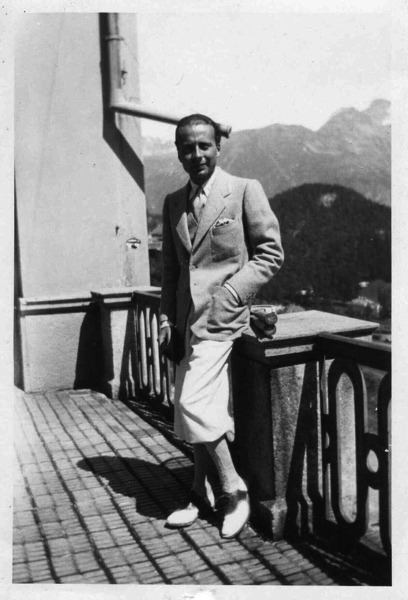
Giacinto Scelsi en Suisse, 1940 © Fondazione Isabella Scelsi
#Giacinto Scelsi#Sharon Kanach#Sebastiano d'Ayala Valva#Joëlle Léandre#Hervé Déjardin#Gabrielle Oliveira Guyon#Arnaud Merlin#France Musique
15 notes
·
View notes
Video
youtube
john cage -- the wonderful widow of eighteen springs
1 note
·
View note
Text

Joëlle Léandre
Photo Lauren Deutsch
2 notes
·
View notes
Text
call for applications: creative improvisation and instant composition
THE WORKSHOP The workshop is addressed to musicians with experience in the field of collective improvisation. The afternoon sessions – led by Alvin Curran, Joëlle Léandre and Eddie Prévost – are devoted to instrumental practice, real-time-composing and deep listening. The goal is to convey the notions, principles and techniques which characterized a phase of great creativity in this area. The…

View On WordPress
#Alvin Curran#Eddie Prévost#Gianmario Borio#Ingrid Pustijanac#Joëlle Léandre#Kai Lothwesen#Marc Hannaford#Maurizio Farina#Sabine Feisst#Valentina Bertolani#Veniero Rizzardi#Vincenzo Caporaletti
0 notes
Text
We Insist Records I. Por Pachi Tapiz. HDO 553 [Podcast]
We Insist Records I. Por Pachi Tapiz. HDO 553 [Podcast]
HDO 553 está dedicado a siete grabaciones publicadas por el sello italiano We Insist! Records. La primera referencia del catálogo Us de Pileline 3 & 5 (WEIN01) se publicó en 2018. Desde entonces se han publicado más de veinte referencias que transitan por distintos caminos musicales. Comenzamos con dos piezas del dúo formado por el violonchelista Luca Tilli y el veterano trombonista Sebi…
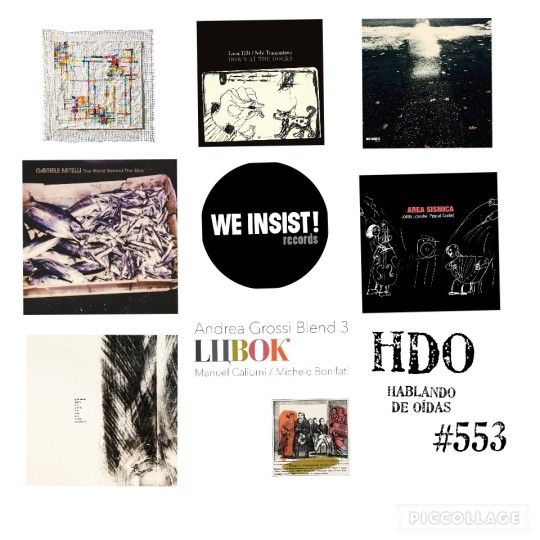
View On WordPress
#Alberto Braida#Andrea Grossi#Andrea Grossi Blend 3#Gabriele Mitelli#Gianmaria Aprile#HDO#HDO Hablando de oídas#Joëlle Léandre#John Edwards#Luca Tilli#Manuel Caliumi#Mark Sanders#Michele Bonifati#Pachi Tapiz#Pascal Contet#podcast de jazz#Sebi Tramontana#We Insist Records
1 note
·
View note
Photo
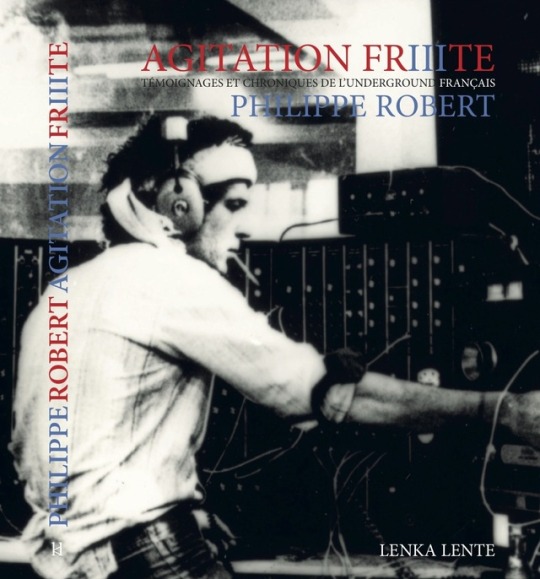
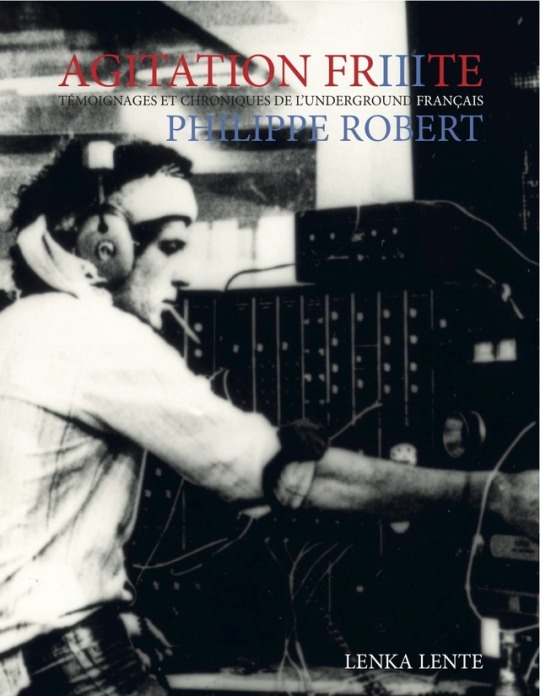
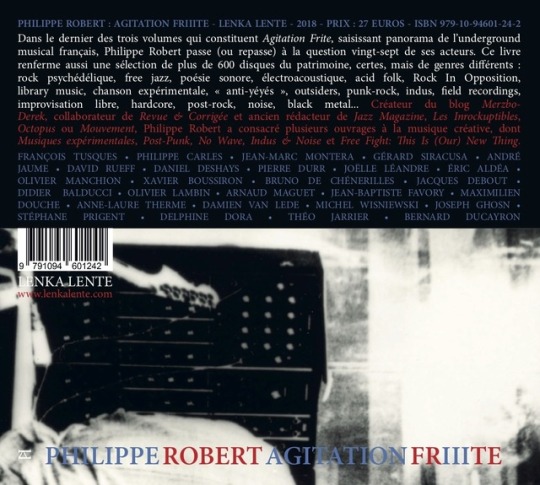
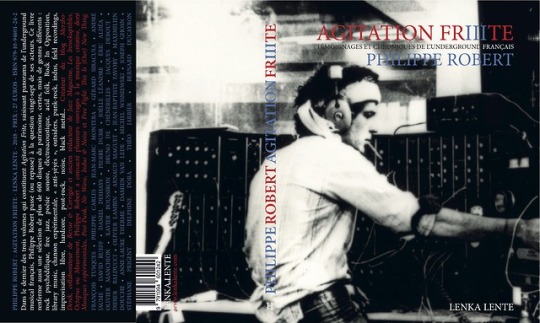
POST-SCRIPTUM 957
AGITATION FRITE 3
PLUS QUE QUELQUES JOURS À ATTENDRE
À LA UNE À LA DEUX À LA TROIS !
#post-scriptum#merzbo derek#philippe robert#agitation frite 3#agitation frite#lenka lente#richard pinhas#delphine dora#arnaud maguet#jean-baptiste favory#françois tusques#joëlle léandre#gérard siracusa#andré jaume#bruno de chénerilles#jacques debout#xavier boussiron#théo jarrier#olivier lambin#olivier manchion#daniel deshays#bernard ducayron#éric aldéa#philippe carles#joseph ghosn
11 notes
·
View notes
Photo
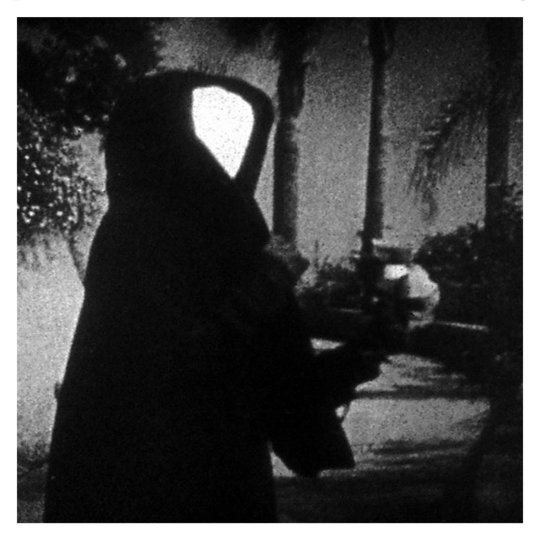
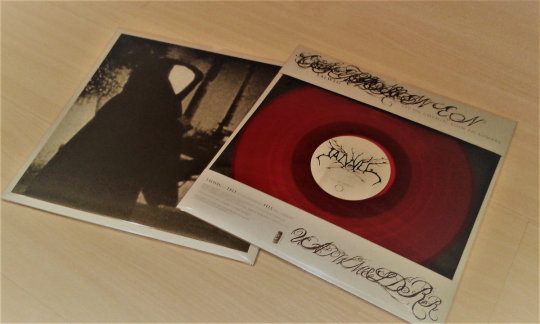
“Si Talweg – jusque-là Erle (Joëlle Vinciarelli) à la voix et Fels (Eric Lombaert) à la batterie – n’est pas au bout de ce « chemin » emprunté en 2010 au son de Substance Mort, c’est qu’à force de sillonner (c’est ici leur second vinyle), il a fini par le changer en paysage. Dans ce paysage, le duo s’est enfoncé ; sous ses pas – c’est à dire : par sa faute –, le chemin s’est encore assombri. Aux râles d’hier, Erle opposera d’autres râles, mais pas seulement. C’est qu’elle et son camarade ont augmenté leur instrumentarium d’une vielle, d’une trompette, de synthétiseurs et de la flûte d’Arnaud Marguet. Alors, avec force, ils agitent d’autres mythologies – c’est, par exemple, un (une ?) Léandre qu’on y trouve, un archet planté dans la gorge – en un noir diptyque exposé à la verticale pr��t à avaler crissements, déviations, grippages… Certes, la batterie et les cornes prendront garde à ne pas effaroucher l’enfant qui calme son angoisse au son d’une comptine, un piano à pouces l’amadouera même, mais un temps seulement. En seconde face, ce sont chez Erle d’autres respirations avant de nouvelles incantations : on ne saurait dire combien de voix s’élèvent sur combien de roulements, ni à quelles hauteurs les premières façons de Talweg (voix contre batterie) évoluent désormais.” Guillaume Belhomme, le son du grisli
5 notes
·
View notes
Text







Joëlle LÉANDRE [painting : Otto WOLS]
"Wols Circus"
(CD. Hus Gallery. 2012 / rec. 2011) [FR]
2 notes
·
View notes


